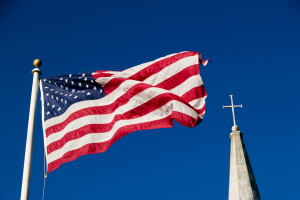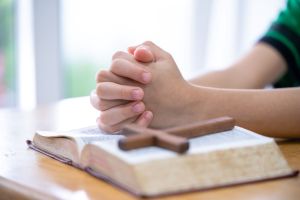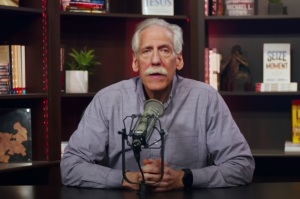Pastor Lists 'Mormon Cult Errors,' Says Those Who Love Jesus Won't Vote Mormon
An evangelical pastor who says his ministry's goal is "uniting the USA in Christ," has created a list of "5 Mormon Cult Errors" that he believes can help Christians from being "deceived" by the Church of Jesus Christ of Latter-day Saints. He insists that those who "love Jesus" should not vote for a Mormon candidate, in this case, Mitt Romney.
Pastor Steven Andrew, head of USA Christian Ministries and author of the 2011 book, Making of a Strong Christian Nation, online list of alleged cult-like practices includes: 1). Mormons deny God; 2). Mormons preach a different gospel; 3). Mormons hide the Cross; 4). Mormons have occult practice; 5). Mormons are Anti-Christian." Andrew, who refers to Romney as "Mormon Romney," has previously called on Franklin Graham and Joel Osteen to repent for suggesting that Christians should have no issues with voting for a Mormon.
In his comments, Andrew takes President Barack Obama to task as well, expressing his doubts about the president's confessed Christian faith.
"If a Mormon or Obama wants to believe things contrary to God's Word, God let's them. But they shouldn't deceive others and say they are Christians," he said, adding that he believes the president has betrayed the United States and mismanaged finances.
"Barack Obama doesn't have God's love for Americans, (nor) does Obama want God's unalienable rights for Christian life, liberty and the pursuit of happiness," a statement on Andrew's USA Christian Ministries website read. "Obama betrayed the USA, seeks to remove freedoms and squandered $6-plus trillion that harms Americans, from the elderly to the youth."
Pastor Andrews told The Christian Post that he created the "5 Mormon Cult Errors" list after examining the issues taking place within the country.
"I'm very concerned for the United States that we have God's blessing. To have God's blessing we need to love God and obey him, because everybody wants us to recover economically and have freedom again," he said. "The Bible tells us that comes from loving God and obeying him."
Andrew said he hopes to educate people about Mormons having a different doctrine than Christians.
"I would like to see Christians understand that Mormons preach a different gospel, which is what apostle Paul warns in Galatians 1:9," Andrew said. "If you preach another gospel you are cursed. If we vote for a Mormon we're turning our back on Jesus Christ."
Nate Nielson, a member of the Church of Jesus Christ of Latter-day Saints, addressed the public's concerns with Mormonism in an article titled "Are Mormons Christian?" The LDS article attempts to clarify the core beliefs of the Mormon church.
"For Latter-day Saints there is absolutely no equivocation on these central doctrinal points: Jesus Christ is the Son of God, sent to Earth to teach the truth and redeem mankind," Nielson writes. "He died on the cross and was literally resurrected three days later. He atoned for the sins of mankind."
Still, Andrew has questioned the religious texts that Mormons use in addition to the Bible, the belief that human beings can become godheads and differences taught in the Church of Latter Day Saints, doctrinal differences highlighted in a previous CP artice examining the "cult" of Mormonism.
Some other differences noted by James Beverley, professor of Christian Thought and Ethics at Tyndale University, in his discussion with CP on Mormonism include the teaching that God used to be a man and grew up to be God, that Jesus is the product of Elohim (the God of this planet) and His wife, and that the true church is the LDS church.
Nielson, insists, however, that his faith has fundamental similarities to other Christian denominations, and that the differences between the Mormon church and other Christian denominations does not mean Latter-day Saints are not Christians.
"Mormons are not interested in parsing semantics or embracing the Nicene Creed or any other post-New Testament creed in order to be accepted by the world of Christian orthodoxy," he writes. "While there is more common ground between Mormons and creedal Christians than many realize, the differences are also substantial," Nielson writes.
"All Christians can acknowledge that the Lord offered two commandments as primary – to love God and to love our neighbors. Doing so makes us followers of Christ, theological interpretations of doctrines notwithstanding."
In a similar argument, Paul de Vries, president of New York Divinity School, hesitates to call Mormonism a "cult" because of the faith's theological differences.
"What's wrong about Mormons doesn't make them a cult," de Vries previously told CP. "I think there's something wrong with what they believe – I think there's something wrong with what Catholics believe – but I don't consider them to be a cult."
However, Pastor Andrew insists that the substantial differences between Mormon presidential candidates like Mitt Romney and Christians are too great. The pastor said that voting for a Mormon candidate or those who are not following Christ could be harmful to America.
"I created this ("5 Mormon Cult Errors" list) for two reasons, politics is important right now. Yes this is political, and as Christians, Exodus 18:21 gives us an example of how we want to vote," Andrew told CP. "If you love Jesus then you won't vote for a Mormon. More importantly if you love Jesus Christ than you're going to vote for candidates that love him."
On his website, Andrews also provides a "Christian Voting Guide," in which he suggests that whomever Christians vote for should "rule" in reverence of God, be efficient and a person of truth, and hate bribery.
"If a person doesn't have all four qualities, they don't meet God's standard," Andrews insists.





























